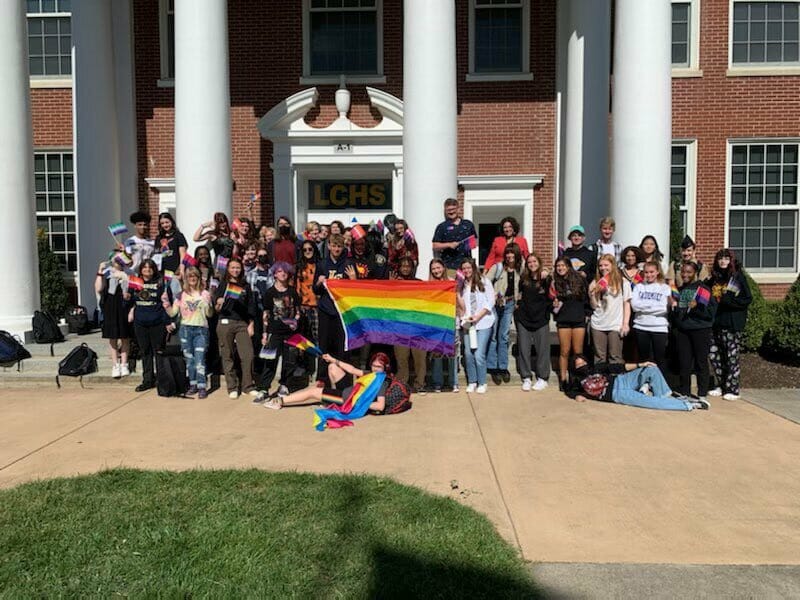On Tuesday afternoon more than 12,000 Virginia students walked out of school in protest of Governor Glenn Youngkin’s revision of school policies for transgender and gender nonconforming students. Across the commonwealth —at over 100 schools—students spoke up for themselves and their classmates with shouts of “DOE, leave us be” and “Trans rights are human rights.” They join a growing number of students in dozens of cities nationwide who are making their voices heard against policies that target LGBTQ classmates.
On March 11th of this year, students at hundreds of schools nationwide participated in a Queer Youth Walkout organized by the student-led campaign Queer Youth Assemble. The organizers cited Florida’s ‘Don’t Say Gay’ law and the Texas state government’s ongoing targeting of transgender youth as motivations, but also pointed to the over 200 anti-LGBTQ laws aimed at restricting LGBTQ youth rights across the country.
Also in March, students responded with walkouts to new laws signed by their state governors or passed by their state lawmakers. In Utah, Gov. Spencer Cox vetoed a state ban on transgender youth participation in school sports. But when the legislature overrode the veto and passed the ban into law, students walked out and made their voices heard. Kids and teens in South Dakota also left school to take to the streets in March after Gov. Kristi Noem banned trans youth from school sports.
Some student protests took place because the attacks were happening close to home. In the Grapevine, Texas school district, elected officials introduced sweeping new policies aimed at LGBTQ students: bans on pronoun use, book restrictions on LGBTQ topics, singling out transgender youth in sports and restroom access, and more. The students at Grapevine high school walked out—and made crystal clear their reasons why.
“I’m embarrassed to be a part of this transphobic and racist school district,” a student named Marceline Temple said in a prepared statement shared with KERA News in North Texas that day. “As a transgender, bisexual person of color, I’m deeply ashamed of our school board and the actions they decided to take. How on earth are adults acting more childish than children? It’s astonishing.”
Perhaps no other student protests received as much national—and international—news coverage as the ones in Florida in response to the state’s controversial ‘Don’t Say Gay’ law. That legislation, signed into law by Gov. Ron Desantis in March, bars teachers from allowing discussion of LGBTQ people, history, and topics in most classrooms. Students protested throughout the process. One student, Zander Moricz, even found a way to cleverly reference his activism against the bill during his graduation speech: after school staff threatened to cut his mic if he mentioned his LGBTQ identity and activism, Moricz replaced references to being LGBTQ with references to his curly hair.
“While having curly hair in Florida is difficult — due to the humidity — I decided to be proud of who I was and started coming to school as my authentic self,” Moricz said during his tongue-in-cheek yet defiant graduation speech. “I’ve been preparing for this speech since I was elected my freshman year. Do you think that I wanted it to be about this? It needs to be about this for the thousands of curly-haired kids who are going to be forced to speak like this for their entire lives as students.”
Gallup research this year shows over 20% of Gen Z is LGBTQ (the youngest gen z-ers are 10, the oldest are now 25.) As many as 1 in 5 students are LGBTQ in every classroom across America—and many more are their friends, allies, siblings, partners, and teammates. Throughout this year, students have been acutely aware that they are being used as political pawns and targeted by one of the most organized and well-funded national anti-LGBTQ movements in history. They know that the people they care about are being targeted, cut off from access to their healthcare, shut out of playing soccer with friends, and worst of all, being mocked on Fox News night after night by cruel adults who seem to know very little about their everyday lives.
Of the more than 240 anti-LGBTQ laws proposed by state legislatures this year, the majority targeted youth. Those bills are ‘Don’t Say Gay’ restrictions on classroom conversation, bans on transgender students playing school sports, they’re sports bans and attempts to make medically necessary healthcare illegal, they’re book bans and restrictions on free speech. Some of the most extreme policies even advocate for taking transgender and gender nonconforming youth away from their parents, but only if those parents love and support them. These policies don’t make any sense to the youth that they purport to “protect.” Today’s students know that there’s nothing wrong with being queer or trans, and that you shouldn’t be singled out or shut out for being who you are. That’s why they are fighting for their classmates. And that’s why, when it comes time for them to register to vote, the officials who have made a game out of targeting LGBTQ youth are going to be held accountable.
Students in Virginia still have a chance at helping convince the state not to adopt the proposed policy change, thanks to a public comment period that opened this Monday. Throughout the year, students in dozens of other cities have walked out of school to protest anti-LGBTQ policies, many against policies already implemented.













